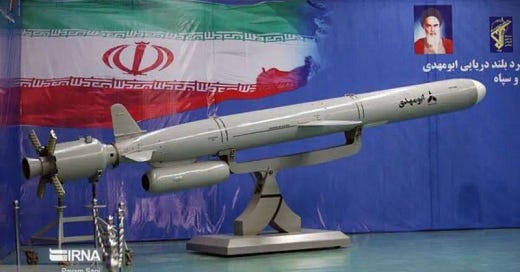Iran: Retaliation Against Israel Will Occur at 'Moment of Maximum Surprise'
Ritter explains how Russia provided new weapons system to Iran to thwart possible attack
Iran said Wednesday that its response to the high-profile assassination of after the high-profile assassination of Hamas’s political chief Ismail Haniyeh.
Iran’s Ayatollah Ali Khamenei said in an open letter to the Iranian people earlier this month that the “Zionist regime” would pay for the assassination. Haniyeh was in the country to attend the new president’s inauguration.
“The timing of Iran’s response will be meticulously orchestrated to ensure that it occurs at a moment of maximum surprise,” Iran’s Permanent Mission to the UN in New York said, according to IRNA.
Iran blamed Israel for the attack, which it said infringed upon its national sovereignty.
“Iran’s response must punish the aggressor for its act of terrorism,” the mission said.
GIRALDI: U.S. ALWAYS LOOKING FOR A NEW ENEMY
The response must “bolster Iran’s deterrence capabilities to induce profound regret within the Israeli regime, thereby serving as a deterrent...Iran’s response must be carefully calibrated to avoid any possible adverse impact that could potentially influence a prospective ceasefire,” according to the mission.
Scott Ritter, the former UN weapons inspector, told “Dialogue Works” that Iran did not ask for the crisis, and it was brought on by Israel’s decision to kill Haniyeh.
He said Iran must retaliate for the killing, but it will likely try to do so in a way that would not force Israel to escalate. He said the ideal for both countries would be that the tension fizzles out like in April.
Gen. (ret.) Yaakov Amidror, a former Israeli national security adviser, said there is “no perfect moment for the Iranians to strike.”
“The last time the Iranians attacked, it took them two weeks to launch the April 14 strike, and they are probably making the same preparation now, according to eKathimerini.com. “It also takes time to decide exactly what the ‘good’ targets are and if you are serious, which the Iranians are. It takes preparation to choose them, prepare the mechanism, and think about the consequences and it does not seem to me that there is any rush in Tehran.”
Ritter said the Biden administration is deliberate when it says the U.S. will defend Israel in the event of an Iranian attack, and means “just that. Defend Israel.”
“That doesn’t mean that the Americans will participate in Israeli offensive actions against either Hezbollah or Iran. I think that's one of the unspoken realities of the situation that the United States is communicating directly to [Israeli Prime Minister] Benjamin Netanyahu and Israel,” he said.
“That the U.S. will be there if Iran chooses to attack Israel” he said. But if Israel extended its operations into Tehran in a major strike, the U.S. will not participate and Israel would be on its own.
Ritter told the podcast that shortly after the Haniyeh assassination, Russia transported advanced surface-to-air missiles, electronic warfare equipment, and radars into Tehran to help it thwart an attack from Israel. He said the shipments have significantly upgraded Iran’s defensive capabilities.
“This changes everything about the Israeli attack profile. Whatever attack plan Israel had to strike Iran now has to be significantly modified to take into account these new weapon systems,” he said.
He said Israel may not have the capabilities to defeat these new capabilities.
“So the combination of the United States saying, ‘We’re not going to help you out to attack Iran,’ and Iran upgrading its defense, has hampered Israel’s response potential,” he said.
TRENDPOST: Israel’s decision to blow up Haniyeh right after attending the presidential inauguration of Pezeshkian, a potential moderate who could improve relations with the West, was Tel Aviv’s latest attempt to sabotage the new administration in Tehran.




